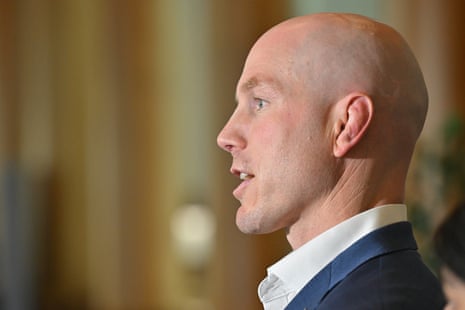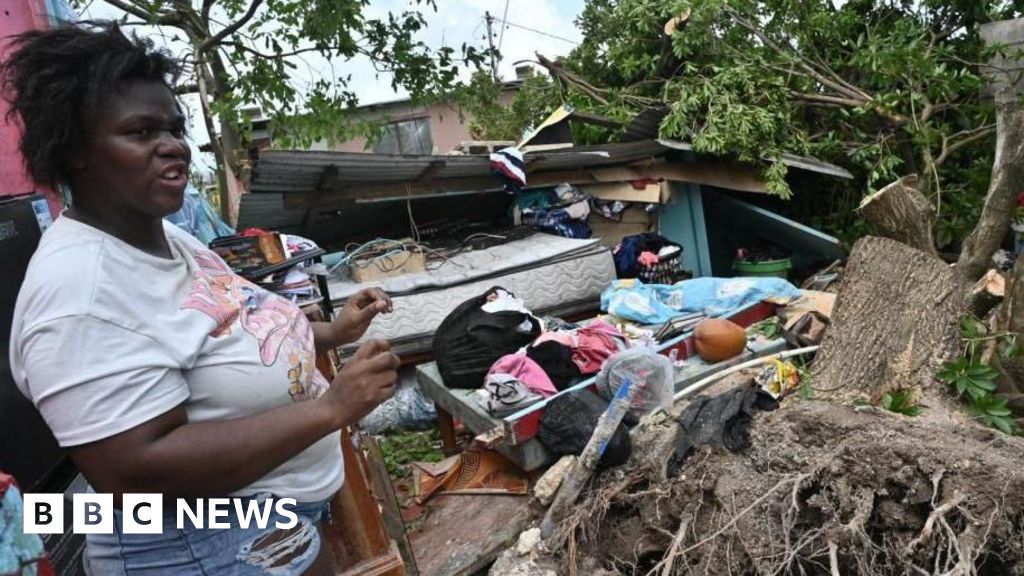Senate showdown looms after Watt labels Pocock revolt against government secrecy a ‘dummy spit’

Josh Butler
A major showdown in the Senate is looming and question time in parliament will be extended by a huge amount, after senator David Pocock led a revolt against government secrecy to punish Labor for sitting on a key report.
In response, the government could retaliate by stripping Liberal MPs of their positions on parliamentary committees. The environment minister, Murray Watt, accused Pocock of a “dummy spit” and “upending decades of tradition”.
Bear with us a moment to explain. Pocock has been seeking a report into government board appointments, which was submitted to the finance minister, Katy Gallagher, two years ago. Pocock, angry at the delay, sought to change the standing orders (or rules) in the Senate to add extra questions to the daily question time, giving the non-government senators more chance to ask questions.
Gallagher said the report would be released “when that work is finished” but opposed Pocock’s actions, claiming senators were “abusing” Senate orders to seek “unreasonable” amounts of government documents. The Coalition and crossbench teamed up with Pocock to pass the motion, which will see the Senate question time extended by about half an hour.

The government is livid about this. Guardian Australia understands that the government may seek to retaliate against the Coalition for supporting Pocock’s motion, which could include stripping Coalition members of deputy chair positions on committees.
Liberals believe that threat is still live today. This could be a fast-moving situation with negotiations behind the scenes, so we’ll bring you updates as they happen.
Watt, a senior minister in the Senate, said he hadn’t been involved in those discussions – having been focused on the environmental law package to be introduced today – but was scathing of Pocock’s move.
What David Pocock did yesterday, with the support of the Coalition and the Greens, was upend decades of Senate tradition and procedure in a grab for power … David Pocock was always in here lecturing the rest of us about the importance of Senate tradition and Senate convention, and he’s just gone and chucked the toys out.
Key events
James Paterson condemns Labor’s ‘authoritarian’ threats to remove Coalition MPs from committee positions
The shadow finance minister, James Paterson, did not mince his words this morning, calling the government’s threats to remove Coalition MPs from deputy House committee positions “petty” and “extraordinary”.
Speaking to Sky News a little earlier, Paterson accused the government of being “authoritarian”.
The government’s response has been utterly extraordinary, completely petty, and much more consistent with the behaviour of an authoritarian government than a democratic one. In return for having to answer extra questions in the parliament, they’re proposing to strip the opposition of deputy chair positions in the House of Representatives. That is an utterly petulant response from the government, and it reflects very badly on them.
The environment minister, Murray Watt, accused senator Pocock of a “dummy spit” and “upending decades of tradition”.
‘Jobs for mates is a real problem in this place’: Pocock
Independent senator David Pocock has the government on the back foot, pushing Labor to release a report it commissioned to look at “jobs for mates” appointments by politicians.
Yesterday, Pocock – with the Coalition and the Greens – passed a vote to add five non-government questions to Senate question time until minister Katy Gallagher tables the report.
And now – as we brought you a moment ago – the government is threatening to pull Coalition MPs from senior positions on House committees.
This morning, the independent ACT senator was still extremely unimpressed with the government’s behaviour, telling journos:
We’ve seen a flat-out refusal to release a document that they said would be released, that I think is really important and in the public interest.
You know, jobs for mates is a real problem in this place, and we’ve even seen that over the last couple of years … we’re ratcheting up the pressure until they release it.
Senate showdown looms after Watt labels Pocock revolt against government secrecy a ‘dummy spit’

Josh Butler
A major showdown in the Senate is looming and question time in parliament will be extended by a huge amount, after senator David Pocock led a revolt against government secrecy to punish Labor for sitting on a key report.
In response, the government could retaliate by stripping Liberal MPs of their positions on parliamentary committees. The environment minister, Murray Watt, accused Pocock of a “dummy spit” and “upending decades of tradition”.
Bear with us a moment to explain. Pocock has been seeking a report into government board appointments, which was submitted to the finance minister, Katy Gallagher, two years ago. Pocock, angry at the delay, sought to change the standing orders (or rules) in the Senate to add extra questions to the daily question time, giving the non-government senators more chance to ask questions.
Gallagher said the report would be released “when that work is finished” but opposed Pocock’s actions, claiming senators were “abusing” Senate orders to seek “unreasonable” amounts of government documents. The Coalition and crossbench teamed up with Pocock to pass the motion, which will see the Senate question time extended by about half an hour.
The government is livid about this. Guardian Australia understands that the government may seek to retaliate against the Coalition for supporting Pocock’s motion, which could include stripping Coalition members of deputy chair positions on committees.
Liberals believe that threat is still live today. This could be a fast-moving situation with negotiations behind the scenes, so we’ll bring you updates as they happen.
Watt, a senior minister in the Senate, said he hadn’t been involved in those discussions – having been focused on the environmental law package to be introduced today – but was scathing of Pocock’s move.
What David Pocock did yesterday, with the support of the Coalition and the Greens, was upend decades of Senate tradition and procedure in a grab for power … David Pocock was always in here lecturing the rest of us about the importance of Senate tradition and Senate convention, and he’s just gone and chucked the toys out.
Lidia Thorpe calls for justice after August neo-Nazi attack on Camp Sovereignty
Lidia Thorpe has tabled a petition with more than 400,000 signatures calling for justice following an attack of the Camp Sovereignty Indigenous site in Melbourne by neo-Nazis in August.
Thorpe, speaking to ABC News Breakfast this morning, says the attack needs to be called a “hate crime” and wants the federal police to thoroughly investigate the incident.
It’s caused fear in our community. I know that children didn’t want to go to school after that attack because of the effect, the ripple effect that that has through families and communities. We know that racism is real in this country. And the racist neo-Nazi attack was a good example of how bad it can be against our people.
We need to send a clear message to the rest of this country that this is a hate crime and neo-Nazi attacks are not tolerated. So, you know, the prime minister needs to come out also and back the federal police to investigate this as a hate crime. To charge these neo-Nazis for hate crimes.
Thorpe says she has had one meeting with state and federal police who said it doesn’t meet the threshold for an investigation, “but that I haven’t been given information as to why it doesn’t meet the threshold”.
Victoria forced to rely on One Nation and others to pass voluntary assisted dying bill

Benita Kolovos
After two days of debate, changes to Victoria’s voluntary assisted dying laws passed parliament last night.
The amendments, which allow doctors to initiate conversations about voluntary assisted dying and expand the eligibility timeframe for all terminal illnesses to 12 months, passed 67 votes to 13.
MPs were granted a conscience vote, with Labor MPs Anthony Carbines, Natalie Suleyman, Iwan Walters, Anthony Cianflone and Kathleen Matthews-Ward all voting against their own government’s bill.
Liberal MPs Kim Wells, Brad Rowswell, Richard Riordan, David Hodgett, Michael O’Brien, Nicole Werner, Chris Crewther and Nationals MP Peter Walsh also voted against the bill.
The bill will now head to the upper house, where Labor doesn’t have a majority but should be able to pass the bill with the support of a motley crew including One Nation and Liberal MPs. Here’s our story from yesterday:
Shadow environment minister says no ‘rush’ to pass environment bill
While Murray Watt wants the bill passed this year (and says there’s a “strong national interest” in getting the reforms passed ASAP), Angie Bell is now asking “what the rush is”.
As we mentioned earlier, it’s five years to the day since Graeme Samuel laid out his reforms to the former Coalition government. On ABC RN Breakfast, Bell says the bill needs to be balanced, and needs to be done right.
I don’t really understand what the rush is. Originally, the minister said he would pass this bill in 12 to 18 months, and now it’s been expedited after the treasurer’s roundtable.
A quick recap here: the government pledged at the economic roundtable in August that it would introduce the environmental reforms before Christmas.
When Bell says the government “failed” in the last parliament to get this done, Sally Sara points out that the Coalition and then-environment minister Sussan Ley also couldn’t get it across the line.
Bell says Ley brought two bills forward which were blocked by Labor and the Greens, and accuses Watt of only consulting with a select few stakeholders on the reforms.
Our environment is going backwards, and we need to stop that. But we also need to make sure that this bill is balanced … we don’t think it’s balanced at this point in time.
We’re open to continuing to talk with the minister on how these bills can be improved to make sure that there is a balance struck and that industry, jobs and investment don’t get a raw deal out of this.
‘Not our job to make a bad bill better,’ says shadow environment minister
The shadow environment minister, Angie Bell, is doing the media rounds this morning, and sits in the “hot seat” – as she calls it – on RN Breakfast after Murray Watt.
The Coalition says its chief concerns lie in the “wide-ranging powers” of the new environment protection body that will be set up, along with the fact that the head of the EPA will not report directly to the minister.
It will be a statutory appointment that will not report directly to the minister. The minister won’t be able to sack that individual. It’ll have to be the governor general that does that. And so, that is a problem in terms of what that outcome might look like in terms of broad-sweeping powers, definitely.
Bell said earlier this morning that Australians should be “alarmed” if Labor go to the Greens to pass this bill. So, host Sally Sara asks, how much the Coalition is willing to compromise in their negotiations to ensure Labor keeps talking to them? Bell says:
Certainly it’s not our job to make a bad bill better but there are some areas that we have concerns on, and we’ll continue to put those areas forward as a problem.
Following on from last post …
Watt is facing a lot of questions about how the new act would define a project that has an “unacceptable” impact on the environment which would trigger an immediate refusal. Along with that comes another power in the draft act which would allow the minister to override some environmental rules if a project is in the national interest.
Watt tells RN Breakfast an unacceptable impact would be something like a project wanting to mine under Uluru or clear a habitat that would “drive a species to extinction”.
On the issue around national interest, Watt says the legislation gives a “flavour” of what that might look like – and emphasises it was an explicit recommendation of Graeme Samuel.
Governments of the day should, in very rare circumstances, have the ability when something is in the national interest to approve a project proceeding, even if it doesn’t meet the usual environmental standards. What we’ve said in the bill is to try to give a flavour of the types of projects that we’re talking about would be most likely defence or security projects, actions that may be undertaken in responding to a natural disaster. We have made the point that that should be rarely used, that there’s got to be transparency with the minister of the day issuing a statement of reasons justifying why they’ve done that. And just to be clear, that decision to approve a project in the national interest would occur after a full assessment was done.
Third time’s the charm? Watt says so
After two failed attempts by parliaments past to legislate the EPBC reforms, Murray Watt, the latest minister to tackle the challenge, says he’s “very confident” the government will pass the reforms.
But, he adds, the real question is with whom and how soon – with neither the Coalition nor the Greens willing to pass the legislation without considerable concessions.
In somewhat poetic timing, today, Watt says, marks five years to the day since Graeme Samuel handed down his landmark review into the current EPBC Act to then environment minister Sussan Ley. Speaking to ABC RN Breakfast this morning, he says:
It really is now or never, if we ever want to pass these reforms we’ve got to get moving with them. We can’t let this go around in circles for five more years because every time we wait and every time we get delayed, we see the environment suffer and we see really important housing, renewables, and other projects get held up in red tape.
Question mark remains over future of Tomago aluminium smelter
There’s still a question mark over the future of the Tomago aluminium smelter in NSW, as the commonwealth negotiates with the state and Rio Tinto.
Despite lauding the government’s $2bn green aluminium announced early this year – which Rio Tinto called a “critical piece in helping future-proof the industry” – the mining company has said high energy prices are reducing the viability of the plant.
The government appears frustrated a deal hasn’t already been made to secure the plant – both Chris Bowen and the industry minister, Tim Ayres, have said they “obviously would prefer that these issues had been resolved with the Tomago smelter”.
Ayres, speaking to ABC AM radio this morning, says while Rio Tinto has been investing in underwriting wind and solar projects around other plants, like in Queensland, “that activity has not been happening in the same way around [Tomago]”.
He’s also asked about his predecessor Ed Husic’s comments to the ABC yesterday, accusing Rio of “corporate villainy”. Ayres takes a more measured tone.
My job here is to work in a careful and calculated way that is about the Australian national interest. We’ve done that work in a series of smelters around the country in a careful way in the public interest, locking in investment in places like Port Pirrie and Hobart … and Mount Isa.


Comment ×